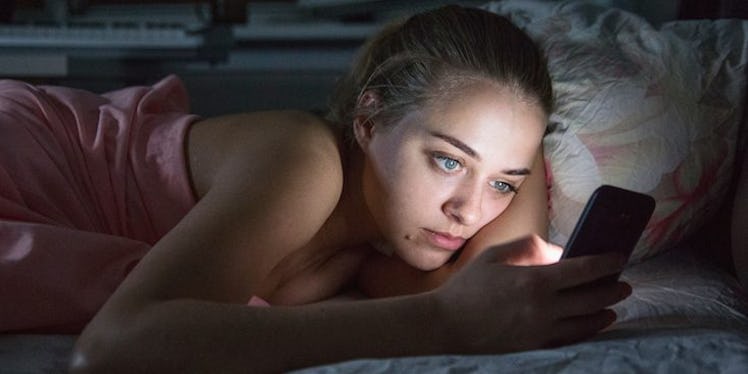
A New Study Suggests A Way To Look At Your Phone In Bed Without Ruining Your Sleep
For some reason, the urge to scroll through social media or research random things on the internet always seems to strike at night, when you're just settling in under the covers to go to sleep. Of course, most people know by now that looking at your phone before bed isn't good for you, but most of us continue to do it anyway. But a new study may have found a way to make these nighttime Twitter scrolls wreak a little less havoc on your beauty rest.
In the study, researchers at the University of Houston College of Optometry instructed participants between the ages of 17 and 42 to go about their usual "digital routine" at night, but while wearing special glasses that block out the blue light emitted from smartphones and TV screens.
After two weeks of doing this, the results showed that all of the participants fell asleep faster, reported a better quality night of sleep, and they slept longer than usual.
Plus, the participants' melatonin levels (the sleep hormone in the body) increased by 58 percent as a result of wearing the special glasses.
That's an even bigger boost of melatonin than what you'd get from taking over-the-counter supplements, ScienceAlert reported.
According to lead researcher on the study Lisa Ostrin, "the most important takeaway is that blue light at night time really does decrease sleep quality."
So, it's really not just the action of scrolling through Instagram that's keeping your brain awake when it shouldn't be -- it's that pesky blue light coming from your phone.
So, what exactly is that blue light?
Blue light is the color on the light spectrum, visible to the human eye, that has shorter wavelengths and less energy. You're mostly exposed to blue light from the sun, but you also get exposure to it from digital screens like computer monitors, cell phones, and iPads.
According to the website Blue Light Exposed, 60 percent of people spend most of their time (more than six hours a day) in front of a digital screen. And, when you're looking at that screen -- particularly when you're in bed -- your face is usually super close to the device. That constant, close exposure can lead to not only unnecessary strain on your eyes, but possibly even damage to the retinas over time.
The thing is, blue light is necessary for your health, as it boosts alertness and regulates your circadian rhythm.
But a boost of energy is basically the exact opposite of what your body needs when you're trying to go to sleep.
By looking at your phone in the dark just before you fall asleep, you're sending a signal to your brain to wake up, thus throwing off your body's whole sleep cycle.
Your body does technically need that signal from blue light, but not right before your bedtime.
The great news is, while you may not have those special glasses used in the University of Houston study, there is something you can do to cut down on your nighttime intake of blue light.
Some devices are already equipped with a blue light filter feature, like the Acer Predator 8 tablet (not sure who uses that, but hey, it's a thing).
For Android users, there are apps available that allow you to apply a blue filter at whatever percentage you'd like. And for iPhone users, you can enable something called "the Night Shift," which dulls the light of the screen so it's less stimulating for your brain. Or, you can get a blue light filter app if you prefer to go that route.
Either way, don't let something as silly as a smartphone ruin your eyesight later in life. Y'all are better than that.
Sweet dreams!